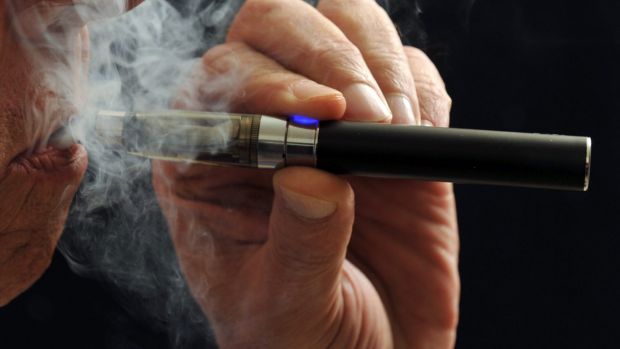
The Australian Institute of Health and Welfare study found one in seven smokers had used e-cigarettes in the last 12 months. Photo: AP
The first national survey covering electronic cigarettes has found up to a third of young Australian smokers are using the devices, as the NSW opposition calls for a state inquiry into their sale.
The Queensland Parliament passed legislation last week that will regulate e-cigarettes in the same manner as cigarettes from January, including restrictions on sales to minors and no-smoking rules.
The Australian Institute of Health and Welfare’s latest survey of household drug use has found one in seven smokers had used e-cigarettes in the past 12 months, with the biggest uptake among 18 to 24-year-olds (27 per cent). A third (32 per cent) of young men in this age group are using e-cigarettes.
This is despite e-cigarettes containing liquid nicotine being illegal for sale in Australia.
Labor’s health spokesman Walt Secord accused the Baird government of being slow to act, as other states and territories moved to regulate the devices.
“At the very least, the rules and regulations that apply to cigarettes in NSW should apply to e-cigarettes,” he said.
Health Minister Jillian Skinner should call for public submissions, because there was a need for a community debate amid conflicting claims that e-cigarettes could either help smokers quit or were a gateway drug to smoking for youth, Mr Secord said.
Western Australia has banned the sale of e-cigarette vaporisers without nicotine, because they are being used to smoke liquid nicotine bought over the internet. The ACT government is considering Queensland-style regulation.
Stephen Jenkins, director of regulatory affairs for Nicoventures, a division of British American Tobacco, said the company was urging state and federal governments to introduce harmonised laws to allow the sale of devices using nicotine.
“Australian smokers should have access to them, but they should be strongly regulated and are not appropriate for under-18s,” he said.
Mrs Skinner said she hadn’t been approached by lobbyists, but the NSW government was considering options for a balanced and evidence-based response to e-cigarettes.
“A roundtable of toxicology, tobacco control and air pollution experts was convened by the NSW Chief Health Officer to review existing evidence about the public health issues associated with e-cigarettes.”
There were a number of gaps in the evidence and policy options were being considered by the NSW government, she said.
Cancer Council Australia director of public policy Paul Grogan said all states should adopt the Queensland laws, which ban sales to minors and smoking in smoke-free areas.
Even non-nicotine vapours, including the fruit flavours marketed to children, were posing a health risk, he said.
“There has to be a blanket ban on access to children because they are sucked straight into their lungs,” he said.
“Smoke-free zones are an issue because employers are now saying people are ‘vaping’ in enclosed spaces.”
Claims that e-cigarettes with nicotine could be used to quit smoking should be viewed with extreme caution, because there was evidence from countries such as Poland that they led to significant increases in youth smoking, Mr Grogan said.
“We have to be extremely suspicious. They [lobbyists] are not seeing e-cigarettes as a transitional market, but a supporting market for smoking cigarettes,” he said.
The AIHW survey of 24,000 people found daily smoking had fallen from 15 per cent to 12.8 per cent.
